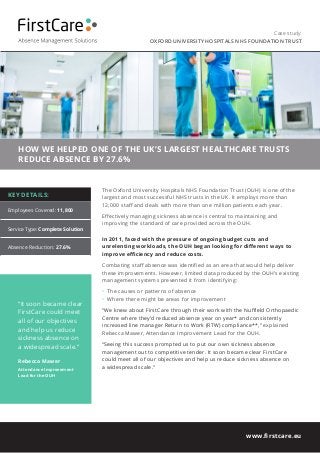
FirstCare Case Study - Oxford University Hospitals NHS Foundation Trust
- 1. Case study: OXFORD UNIVERSITY HOSPITALS NHS FOUNDATION TRUST HOW WE HELPED ONE OF THE UK’S LARGEST HEALTHCARE TRUSTS REDUCE ABSENCE BY 27.6% The Oxford University Hospitals NHS Foundation Trust (OUH) is one of the largest and most successful NHS trusts in the UK. It employs more than 12,000 staff and deals with more than one million patients each year. Effectively managing sickness absence is central to maintaining and improving the standard of care provided across the OUH. In 2011, faced with the pressure of ongoing budget cuts and unrelenting workloads, the OUH began looking for different ways to improve efficiency and reduce costs. Combating staff absence was identified as an area that would help deliver these improvements. However, limited data produced by the OUH’s existing management systems prevented it from identifying: • The causes or patterns of absence • Where there might be areas for improvement “We knew about FirstCare through their work with the Nuffield Orthopaedic Centre where they’d reduced absence year on year* and consistently increased line manager Return to Work (RTW) compliance**,” explained Rebecca Mawer, Attendance Improvement Lead for the OUH. “Seeing this success prompted us to put our own sickness absence management out to competitive tender. It soon became clear FirstCare could meet all of our objectives and help us reduce sickness absence on a widespread scale.” “It soon became clear FirstCare could meet all of our objectives and help us reduce sickness absence on a widespread scale.” Rebecca Mawer Attendance Improvement Lead for the OUH KEY DETAILS: Employees Covered: 11,800 Service Type: Complete Solution Absence Reduction: 27.6% www.firstcare.eu
- 2. Case study: OXFORD UNIVERSITY HOSPITALS NHS FOUNDATION TRUST Taking a collaborative, thorough approach to implementation was key. A project management team, led by Rebecca Mawer, was created at OUH, and we set up an implementation team. One of the first tasks for both parties was to create a six-month project plan that ensured all key stakeholders were informed about FirstCare’s appointment to manage the OUH’s sickness absence. More importantly, all staff needed to be informed about the changes to the OUH’s absence policy. This involved introducing two separate procedures to ensure short-term and long-term sickness absence was managed consistently by managers going forward. We worked with the OUH to deliver a case study walkthrough approach to training its 700 line managers on the new procedures and our involvement. This included delivering 36 workshops over five weeks that covered topics ranging from occupational health to our service and online absence management portal, myFirstCare. Setting objectives and working to meet them. It was important absence remained a priority among managers. One of the ways in which we help achieve this was to provide the OUH with a dedicated account management team, who identified and analysed its absence trends and created monthly absence summary reports for the divisional HR teams. These reports highlighted key departments and employees in need of attention and provided managers with recommendations for improvement. New KPIs were also created to improve absence monitoring and line manager compliance with conducting RTW interviews and absence review meetings. Every line manager was also given access to myFirstCare, which enabled them to easily view real-time absence data about their teams. Within a year of working with FirstCare, absence has reduced by 27.6%, helping the OUH to reduce its bank and agency spend while increasing staff availability. Educating managers on the new way of managing sickness absence was a particular challenge. Making it easy for managers to focus on absence was central to our overall success. www.firstcare.eu ABSENCE REDUCTION 27.6%
- 3. Case study: OXFORD UNIVERSITY HOSPITALS NHS FOUNDATION TRUST “Having real-time absence data given directly to line managers enables us to make quicker and better-informed decisions as soon as an absence is reported. This, in turn, maximises patient care levels,” added Rebecca. “Take one of our in-patient wards, for example. If a staff nurse is unwell overnight and cannot attend work the next day, they contact FirstCare. Regardless of who’s working on the ward at the time, they can make sure adequate provisions are made well before the shift starts, which minimises disruption for patients and colleagues. “Working with FirstCare means we can also take more of a proactive approach to dealing with staff who have underlying or long-term sickness absence. We can take intervention on day one and provide them with the support they need to return to work sooner. Ultimately, we’re able to improve our standard of patient care because we’re not so dependent on agency, bank staff or spreading the workload across departments.” Plans are already in place to continue the good work into the next financial year. We’re keen to help the OUH build on the initial success we’ve already achieved. Plans for 2015/16 have been created that will focus on areas including improving staff wellbeing, increasing operational efficiency and continuing to reduce spend on agency and bank staff. The reduction in absence equals a saving of almost 3 days per employee: Dayslostperemployee Nov 2012 to Oct 2013 (pre FirstCare) Nov 2014 to Oct 2015 (with FirstCare) www.firstcare.eu “Working with FirstCare means we can also take more of a proactive approach to dealing with staff who have underlying or long-term sickness absence.” Rebecca Mawer Attendance Improvement Lead for the OUH Want to know more about effectively managing sickness absence or how we can help you reduce absence rates, increase productivity and reduce costs? Call us on 03454 565 730 or email info@firstcare.eu * Reduced from 4.44% in 2006 to 3.29% in 2012. ** Increased from 18% in 2007 to 84% in 2012. 0 1 2 3 4 5 6 7 8 9 10 11 27.6% 10.17 7.37reduction